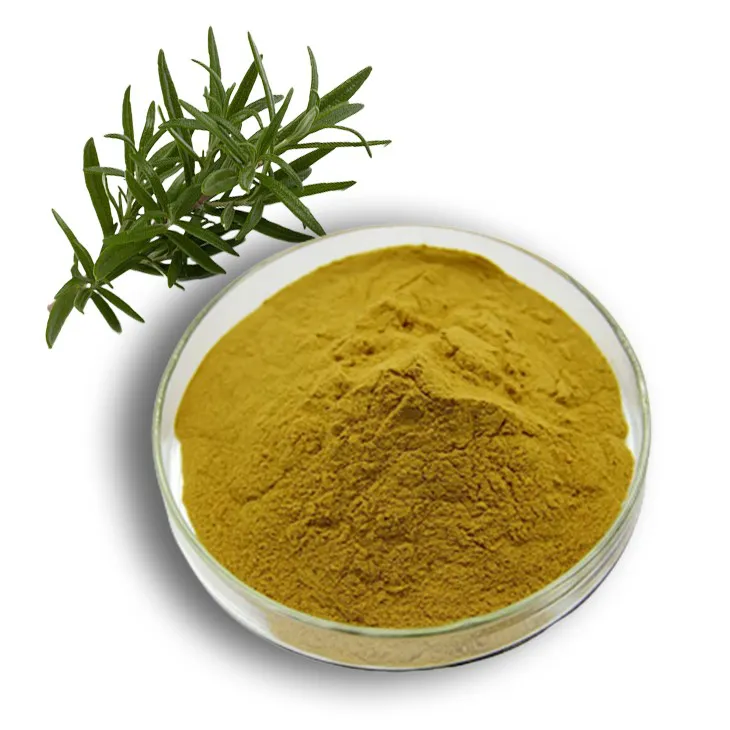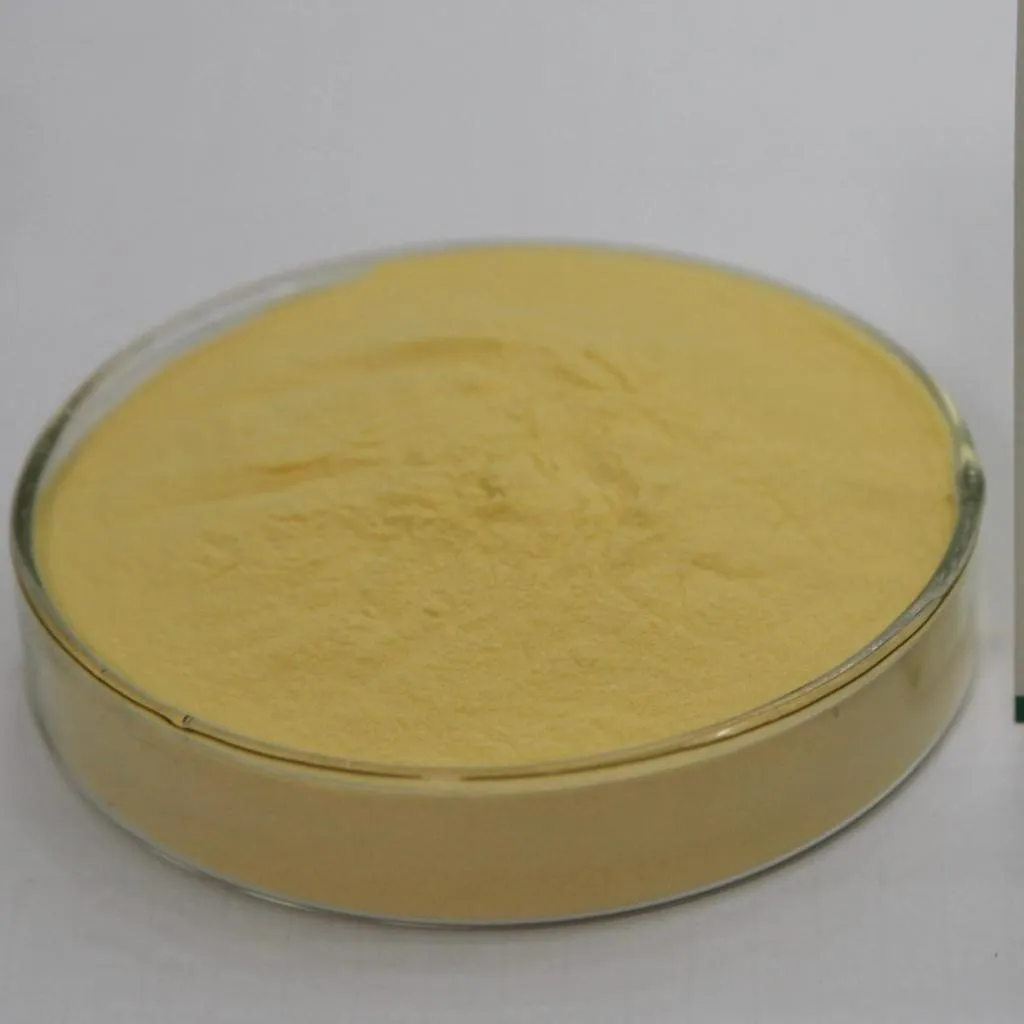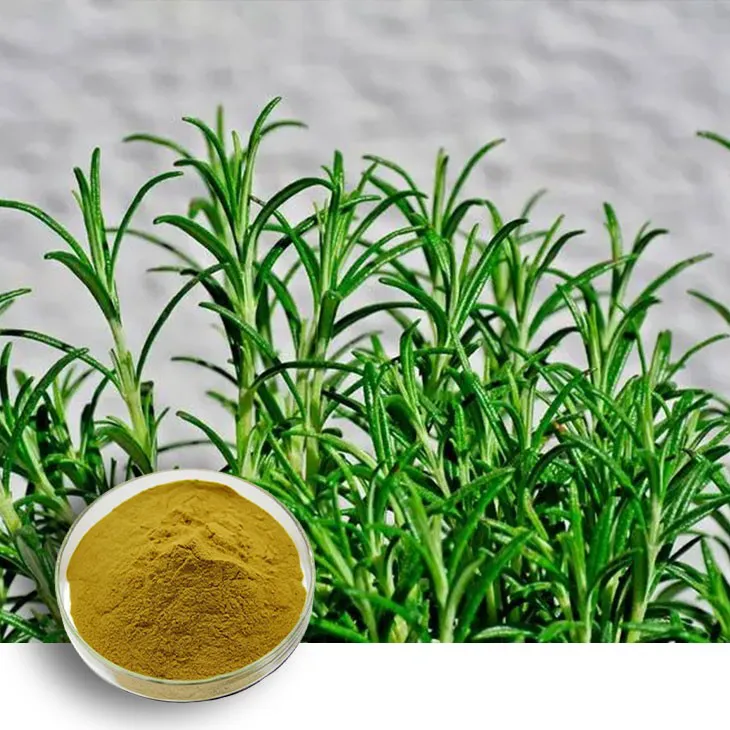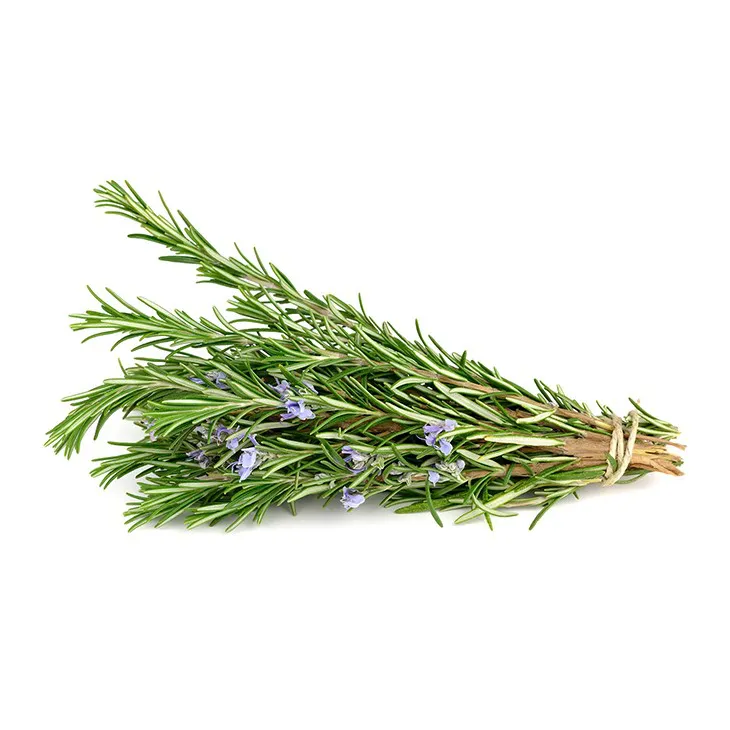- 0086-571-85302990
- sales@greenskybio.com
5 Magical Things Made from Rosemary Extract.
2024-11-14

1. Skincare Products
Rosemary extract has become a popular ingredient in skincare products due to its numerous beneficial properties.
Antioxidant Power
One of the key reasons for its inclusion in skincare is its antioxidant capabilities. Free radicals are unstable molecules that can damage skin cells, leading to premature aging, wrinkles, and a dull complexion. Rosemary extract is rich in antioxidants such as rosmarinic acid and carnosic acid. These antioxidants work to neutralize free radicals, protecting the skin from environmental stressors like pollution and UV radiation. For example, in anti - aging creams, Rosemary extract helps to prevent the breakdown of collagen and elastin, which are essential for maintaining skin's firmness and elasticity.
Anti - Inflammatory Benefits
Another advantage of rosemary extract in skincare is its anti - inflammatory properties. Skin inflammation can be caused by various factors, including allergies, acne, and eczema. The anti - inflammatory compounds in rosemary extract can soothe irritated skin. In acne treatments, it can reduce redness and swelling associated with pimples, helping to speed up the healing process. It is also beneficial for those with sensitive skin, as it can calm down skin reactions and reduce discomfort.
Improving Skin Tone
Rosemary extract can contribute to a more even skin tone. It helps to regulate melanin production in the skin. Melanin is the pigment responsible for skin color, and overproduction can lead to dark spots and hyperpigmentation. By inhibiting excessive melanin production, rosemary extract can fade existing dark spots and prevent new ones from forming. This makes it a valuable ingredient in products designed for skin brightening and complexion improvement.

2. Haircare Products
Rosemary extract has found its way into the world of haircare products as well, offering several benefits for hair health.
Stimulating Hair Growth
It is believed that rosemary extract can stimulate hair growth. The extract has the ability to improve blood circulation in the scalp. When the scalp has a healthy blood supply, the hair follicles receive more nutrients and oxygen, which are essential for hair growth. Some hair growth serums and shampoos containing rosemary extract claim to promote thicker and fuller hair over time. In addition, it may also help to strengthen the hair follicles, reducing hair fall and breakage.
Scalp Health
Maintaining a healthy scalp is crucial for beautiful hair, and rosemary extract can play a significant role in this regard. Its anti - inflammatory and antimicrobial properties help to keep the scalp clean and free from infections. Dandruff is often caused by a yeast - like fungus on the scalp, and rosemary extract can combat this fungus, reducing dandruff and itchiness. Regular use of rosemary - based shampoos can leave the scalp feeling fresh and healthy.
Adding Shine to Hair
Rosemary extract can also enhance the appearance of hair by adding shine. It smoothes the hair cuticle, which is the outermost layer of the hair shaft. When the cuticle is smooth, light reflects off the hair more evenly, giving it a shiny and healthy - looking appearance. This makes it a great addition to hair conditioners and hair oils.

3. Culinary Delights
Rosemary extract imparts a unique and delightful flavor to a wide range of culinary creations.
Seasoning for Meats
One of the most common uses of rosemary extract in cooking is as a seasoning for meats. Whether it's beef, pork, or chicken, rosemary adds a rich, earthy flavor. The extract can be used in marinades, rubs, or added directly to the cooking process. For example, a simple marinade for steak could include rosemary extract, olive oil, garlic, and a touch of lemon juice. This combination not only flavors the steak but also helps to tenderize it. In roasted meats, the aroma of rosemary fills the kitchen, enhancing the overall dining experience.
Flavoring in Breads and Pastries
Rosemary extract also finds its place in breads and pastries. It adds a unique twist to traditional baked goods. In bread, it can be incorporated into the dough, giving the loaf a subtle herbal flavor. Rosemary - flavored focaccia bread is a popular example, with the rosemary complementing the olive oil and salt in the recipe. In pastries, it can be used in fillings or as a topping. For instance, a rosemary - infused cream filling in a tart can create a sophisticated and unexpected flavor combination.
Enhancing Sauces and Soups
When it comes to sauces and soups, rosemary extract can be a game - changer. It adds depth and complexity to the flavor profile. In tomato - based sauces, a small amount of rosemary extract can bring out the natural sweetness of the tomatoes while adding a herbal note. In soups, whether it's a hearty vegetable soup or a creamy potato soup, rosemary extract can add a warm, comforting flavor. It can be added at the beginning of the cooking process to infuse the flavors throughout or added towards the end for a more pronounced flavor.

4. Natural Preservative
Rosemary extract has emerged as a promising natural preservative in the food and cosmetic industries.
Food Preservation
In the food industry, the search for natural preservatives has been on the rise due to consumer demand for clean - label products. Rosemary extract contains compounds that can inhibit the growth of bacteria, yeasts, and molds. For example, in oils and fats, it can prevent rancidity by protecting against lipid oxidation. This is important for products like salad dressings, where the quality of the oil is crucial for taste and shelf - life. It can also be used in processed meats, cheeses, and baked goods to extend their shelf - life without the need for synthetic preservatives.
Cosmetic Preservation
Similarly, in the cosmetic industry, rosemary extract can act as a natural preservative. Cosmetics are prone to microbial contamination, which can affect their safety and quality. The antimicrobial properties of rosemary extract can help to keep cosmetic products free from harmful bacteria and fungi. It can be used in creams, lotions, and makeup products, providing a natural alternative to synthetic preservatives that some consumers may be sensitive to.

5. Aromatherapy
Rosemary extract plays an important role in aromatherapy due to its invigorating and relaxing properties.
Stress Relief
The scent of rosemary has been shown to have a calming effect on the nervous system. In aromatherapy, rosemary essential oil (derived from rosemary extract) can be diffused in the air. When inhaled, it can reduce stress and anxiety levels, promoting a sense of relaxation. This can be especially beneficial in a busy work environment or during times of high stress.
Improving Concentration
On the other hand, rosemary extract can also enhance concentration. The aroma of rosemary has been associated with increased mental clarity and focus. Some people use rosemary - scented products, such as candles or essential oil diffusers, while studying or working to improve their productivity. It stimulates the brain and can help to keep the mind alert.
Relieving Headaches
Rosemary extract may also be helpful in relieving headaches. The relaxing and anti - inflammatory properties of the extract can help to ease the pain associated with headaches. Applying a diluted rosemary essential oil to the temples or inhaling the scent can provide relief for some headache sufferers.
FAQ:
Question 1: What are the benefits of rosemary extract in skincare products?
Rosemary extract in skincare products has several benefits. It is rich in antioxidants, which can help fight against free radicals that cause skin aging. It also has anti - inflammatory properties, which can soothe irritated skin, reduce redness, and may be helpful for conditions like acne and eczema. Additionally, it can improve skin tone and texture over time.
Question 2: How is rosemary extract used in culinary?
In culinary, rosemary extract can be used in a variety of ways. It can be added to marinades for meats, such as chicken or lamb, to enhance flavor. It is also used in some sauces and dressings. Rosemary extract can add a unique, earthy and slightly minty flavor to dishes. It can be used in baking as well, for example, in some bread recipes to give a distinct taste.
Question 3: Can rosemary extract be used in haircare?
Yes, rosemary extract can be used in haircare. It may help stimulate hair growth as it can improve blood circulation to the scalp. It also has antimicrobial properties that can keep the scalp clean and healthy, reducing problems like dandruff. Some hair products contain rosemary extract to add shine and strength to the hair.
Question 4: Are there any potential side effects of using products with rosemary extract?
For most people, using products with rosemary extract is safe. However, in some cases, it may cause allergic reactions, especially in those with sensitive skin or known allergies to plants in the Lamiaceae family. If applied in large amounts topically, it might cause skin irritation in some individuals. When consumed in large quantities (which is rare in normal culinary use), it could potentially cause stomach upset.
Question 5: How is rosemary extract obtained?
Rosemary extract is typically obtained through a process of extraction. This can involve using solvents such as ethanol or supercritical carbon dioxide to draw out the active compounds from the rosemary plant. The plant material is first dried and then processed to extract the valuable components that make up the extract.
Related literature
- The Antioxidant and Antimicrobial Properties of Rosemary Extract in Food Preservation"
- "Rosemary Extract: A Natural Ingredient for Skincare - Efficacy and Safety"
- "Utilization of Rosemary Extract in Culinary and Nutraceutical Applications"
- ▶ Hesperidin
- ▶ citrus bioflavonoids
- ▶ plant extract
- ▶ lycopene
- ▶ Diosmin
- ▶ Grape seed extract
- ▶ Sea buckthorn Juice Powder
- ▶ Beetroot powder
- ▶ Hops Extract
- ▶ Artichoke Extract
- ▶ Reishi mushroom extract
- ▶ Astaxanthin
- ▶ Green Tea Extract
- ▶ Curcumin Extract
- ▶ Horse Chestnut Extract
- ▶ Other Problems
- ▶ Boswellia Serrata Extract
- ▶ Resveratrol Extract
- ▶ Marigold Extract
- ▶ Grape Leaf Extract
- ▶ blog3
-
High purity olive leaf extract
2024-11-14
-
Lavender oil extraction method
2024-11-14
-
100% organic virgin sea buckthorn fruit oil
2024-11-14
-
Lotus leaf extract powder factory in China
2024-11-14
-
China aged garlic extract supplier
2024-11-14
-
Deer antler extract powder manufacturer
2024-11-14
-
Saw palmetto extract vs whole herb
2024-11-14
-
Maitake Mushroom Extract
2024-11-14
-
Lemon Balm Extract
2024-11-14
-
Propolis Extract Powder
2024-11-14
-
Nettle leaf extract
2024-11-14
-
Elderberry Extract
2024-11-14
-
Phellodendron Extract
2024-11-14
-
Pomegranate Extract
2024-11-14
-
Curcumin
2024-11-14
-
Uridine-5'-monophosphate Disodium salt
2024-11-14
-
Giant Knotweed Extract
2024-11-14





















